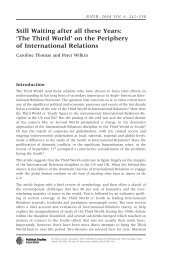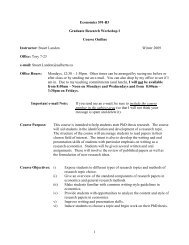Is comparative politics dead? Rethinking the field in the post-Cold ...
Is comparative politics dead? Rethinking the field in the post-Cold ...
Is comparative politics dead? Rethinking the field in the post-Cold ...
Create successful ePaper yourself
Turn your PDF publications into a flip-book with our unique Google optimized e-Paper software.
HOWARD J WIARDAprone than <strong>in</strong> <strong>the</strong> more developed countries, with street demonstrations, strikes,riots, structured violence, property takeovers, etc, that have <strong>the</strong> potential toproduce more open-ended <strong>politics</strong>. Equity and social justice issues are stillcritical, class and racial divisions rema<strong>in</strong> sharp, and <strong>the</strong> neoliberal agenda hasnot yet produced <strong>the</strong> economic ga<strong>in</strong>s expected. 26 However, with both Marxism±Len<strong>in</strong>ism and traditional statism/mercantilism discredited, <strong>the</strong>re is presently noreal alternative to <strong>the</strong> neoliberal model. Political debate has largely concentratedon <strong>the</strong> pace and extent of <strong>the</strong>se changes, not on <strong>the</strong> need for reform itself. Onceaga<strong>in</strong> it is <strong>the</strong> <strong>politics</strong> of `more or less’ ra<strong>the</strong>r than that of ei<strong>the</strong>r or that isemerg<strong>in</strong>g triumphantÐ less dramatic than Lat<strong>in</strong> American <strong>politics</strong> <strong>in</strong> <strong>the</strong> past butprobably more hopeful, too.Russia and Eastern Europe are presently go<strong>in</strong>g through many of <strong>the</strong> samesystems changes as did Sou<strong>the</strong>rn Europe, Asia and Lat<strong>in</strong> America <strong>in</strong> previousdecades. Indeed, one is struck by <strong>the</strong> remarkable parallels between <strong>the</strong>se fourareas. To use a now almost forgotten phrase from W W Rostow, 27 it may be thatnot only was Marxism±Len<strong>in</strong>ism a `disease of <strong>the</strong> transition’ (to modernity) butalso that authoritarian±corporatism was similarly a `disease’ of <strong>the</strong> same transition.That is to say that both Marxism±Len<strong>in</strong>ism on <strong>the</strong> Left and authoritariancorporatism on <strong>the</strong> Right were products of a certa<strong>in</strong> vulnerable stage of <strong>the</strong>transition from tradition to modernity, a stage and time period where systembreakdown and extremism of both Left and Right were possible. We have longknown that communism and fascism were not only often bitter enemies but alsoexhibited numerous parallels, 28 and now we know ano<strong>the</strong>r reason why: <strong>the</strong>y wereproducts of <strong>the</strong> same time period and of many of <strong>the</strong> same wrench<strong>in</strong>g, divisive,potentially morbi® c social and political forces. But now, after a long <strong>in</strong>terregnum(40 years of authoritarian corporatism <strong>in</strong> Spa<strong>in</strong> and Portugal, 70 years ofMarxism±Len<strong>in</strong>ism <strong>in</strong> <strong>the</strong> USSR), those conditions have dramatically changedand so have <strong>the</strong> two k<strong>in</strong>ds of countries discussed. 29Let us make some prelim<strong>in</strong>ary dist<strong>in</strong>ctions, which are well worth fur<strong>the</strong>r<strong>comparative</strong> <strong>politics</strong> research. 30 First, because of geography, proximity, history,culture and sociologyÐ to say noth<strong>in</strong>g of <strong>the</strong> fact that its Marxism±Len<strong>in</strong>ism wasimposed by <strong>in</strong>vad<strong>in</strong>g and occupy<strong>in</strong>g Soviet armiesÐ Eastern Europe is <strong>in</strong> generalcurrently closer to <strong>the</strong> Western model politically (democracy) and economically(mixed market economies) than is Russia. Second, with<strong>in</strong> Eastern Europe <strong>the</strong>reare also major differences: Poland, Hungary, <strong>the</strong> Czech Republic, Slovakia, <strong>the</strong>Baltic states and Slovenia are closer to <strong>the</strong> West politically and economically(democracy and a free market/mixed economy) than are Romania, Bulgaria,Croatia, Bosnia and Serbia. Poland, Hungary and <strong>the</strong> Czech Republic are <strong>in</strong> <strong>the</strong>process of be<strong>in</strong>g admitted to NATO; negotiations with some of <strong>the</strong> o<strong>the</strong>r countriesover NATO admission are go<strong>in</strong>g forward; and it seems clear that <strong>in</strong> one form orano<strong>the</strong>r much of Eastern (now Central) Europe will be <strong>in</strong>tegrated economically,ma<strong>in</strong>ly through German and Austrian <strong>in</strong>vestment, <strong>in</strong>to Europe as well. Exceptperhaps for Bosnia, <strong>the</strong> great systems debate <strong>in</strong> Eastern Europe of recent yearsover which direction to pursue seems to be ma<strong>in</strong>ly over as well; democracy anda mixed economy are becom<strong>in</strong>g triumphant here as <strong>in</strong> o<strong>the</strong>r areas surveyedÐeven though numerous structural reforms are still required <strong>in</strong> <strong>the</strong>se countries.Russia and some members of <strong>the</strong> Commonwealth of Independent States942
















